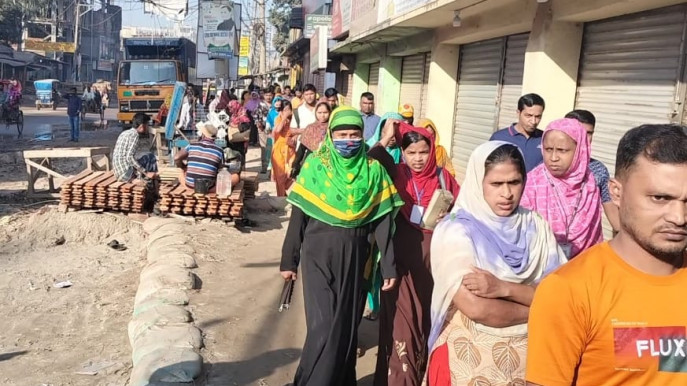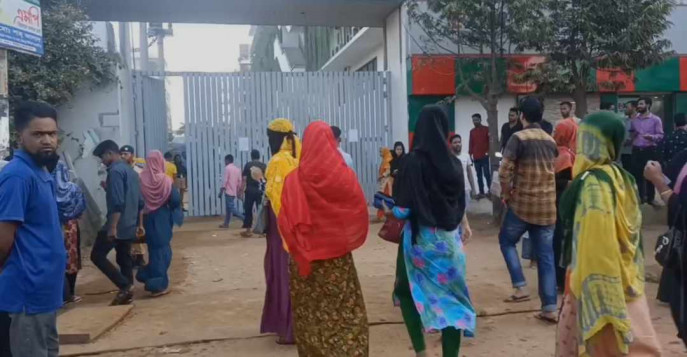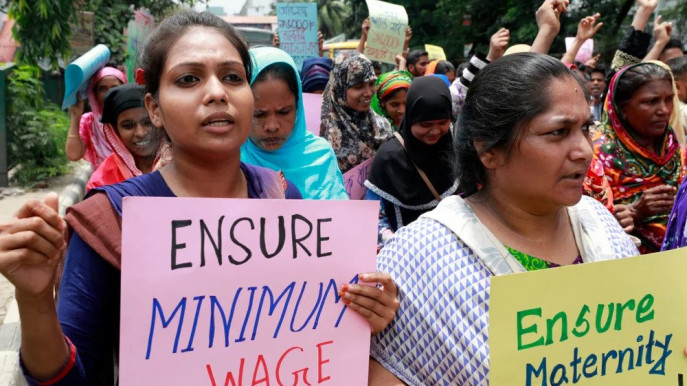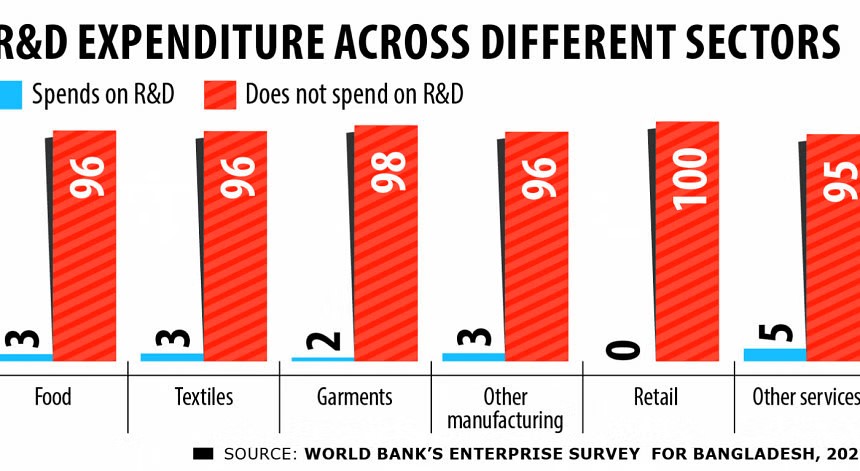খুলেছে আশুলিয়ার পোশাক কারখানা, কাজে ফিরেছেন শ্রমিকরা
এদিকে ন্যূনতম মজুরি বৃদ্ধির দাবিতে আশুলিয়ার বিভিন্ন পোশাক কারখানায় হামলা ও ভাঙচুরের অভিযোগে থানায় দায়েরকৃত মামলাগুলোতে আরও ৮ জন গ্রেপ্তার হয়েছেন
ন্যূনতম মজুরি বৃদ্ধির দাবিতে ঢাকার আশুলিয়ায় প্রায় দুই সপ্তাহ যাবত চলা পোশাক শ্রমিকদের টানা আন্দোলন ও শ্রমিক অসন্তোষের জেরে শেষ কয়েকদিন এই অঞ্চলের উল্লেখযোগ্য সংখ্যক পোশাক কারখানা শ্রম আইনের ১৩ (১) ধারায় ‘নো ওয়ার্ক, নো পে’র ভিত্তিতে বন্ধ থাকার পর আজ মঙ্গলবার (১৪ নভেম্বর) সকাল থেকে দুয়েকটি ব্যতিত আশুলিয়ার সকল কারখানা খুলে দেওয়া হয়েছে।
বন্ধ কারখানাগুলো খুলে দেওয়ার বিষয়ে কারখানা কর্তৃপক্ষের বার্তা পেয়ে সকাল থেকে কারখানাগুলোতে স্বতঃস্ফূর্তভাবে কাজে যোগদান করেছেন এই অঞ্চলের পোশাক শ্রমিকরা।

সকালে আশুলিয়ার জামগড়া, নরসিংহপুর, কাঠগড়া সহ বিভিন্ন এলাকা ঘুরে দেখা যায়, এসব এলাকার অধিকাংশ কারখানার সামনে কারখানা খুলে দেওয়ার বিষয়ে নোটিশ দেওয়া হয়েছে।
কারখানাগুলো খুলে দেওয়ায় সকালে নির্ধারিত সময়ের মধ্যেই কারখানাগুলোতে প্রবেশ করেন শ্রমিকরা।
এসময় বিভিন্ন পোশাক কারখানার শ্রমিকরা জানান, অনেক কারখানা কর্তৃপক্ষ কারখানার গেইটে কারখানা খুলে দেওয়ার বিষয়ে গতকাল নোটিশ টানিয়ে দেওয়ার পাশাপাশি কারখানাগুলোর সংশ্লিষ্ট ইউনিটের সুপারভাইজাররা শ্রমিকদের মুঠোফোনে আজ থেকে কারখানা খোলা থাকার কথা জানিয়ে শ্রমিকদের কাজে যোগদান করতে বলেন।
পোশাক শ্রমিক মর্জিনা বলেন, “গতকাল রাতে সুপারভাইজার ফোন করে জানিয়েছে আজ থেকে কারখানা খোলা থাকবে, সকালে কাজে যোগ দিতে বলেছে। জানার পর আজ কারখানায় আসলাম।”
এছাড়াও বিভিন্ন পোশাক কারখানার সামনে ও গুরুত্বপূর্ণ পয়েন্টগুলোতে গত কয়েকদিনের মত আজও অতিরিক্ত পুলিশ সদস্য মোতায়েন থাকার পাশাপাশি টহল দিতে দেখা গেছে আইনশৃঙ্খলা রক্ষাকারী বাহিনীর সদস্যদের। শান্ত রয়েছে শিল্পাঞ্চলের সার্বিক পরিস্থিতি।
আশুলিয়া শিল্প পুলিশ-১ এর পুলিশ সুপার মোহাম্মদ সারোয়ার আলম জানান, তাদের আওতাধীন সাভার, আশুলিয়া ও ধামরাই এলাকায় ১ হাজার ৭৯২টি পোশাক কারখানার মধ্যে যেসকল পোশাক কারখানা গতকাল পর্যন্ত শ্রম আইনের ১৩ (১) ধারায় বন্ধ ছিলো, একটি ব্যতিত তার সবগুলোই আজ খুলে দেওয়া হয়েছে।
তিনি বলেন, “একটিমাত্র কারখানা ছাড়া আজ বাকি সব কারখানায় কাজ শুরু হয়েছে। এর মধ্যে কিছু কারখানায় আংশিক কার্যক্রম চলমান রয়েছে। শুধুমাত্র শ্রমিকরা কাজ না করায়, আশুলিয়ার নাবা নীট কম্পোজিট লিমিটেড কারখানাটি আজ বন্ধ রয়েছে। গত কয়েকদিনের মত আজও পরিস্থিতি স্বাভাবিক রয়েছে।”
এদিকে পোশাক কারখানাগুলো খুলে দেওয়ায় স্বস্তি প্রকাশ করে গার্মেন্টস শ্রমিক ঐক্য লীগের সাধারণ সম্পাদক মো. সারোয়ার আলম বলেন, “পোশাক কারখানা খুলে দেওয়ার এই বিষয়টি স্বস্তিদায়ক। আমরা চাই আবার এই শিল্পাঞ্চলে পুরোনো কর্মচঞ্চলতা ফিরে আসুক। আশা করছি খুব শীঘ্রই আবারও সুন্দর পরিবেশ ফিরে আসবে।”
এসময় কারখানায় হামলা ও ভাঙচুরের ঘটনায় দায়েরকৃত মামলায় কোন নিরীহ শ্রমিক যেন হয়রানির শিকার না হন সে বিষয়ে সংশ্লিষ্টদের প্রতি লক্ষ্য রাখার আহ্বান জানিয়ে এই শ্রমিক নেতা বলেন, “কোন শ্রমিক হামলা, ভাঙচুর, নাশকতার সাথে জড়িত হতে পারে না। আমরা চাই যারাই এসব করেছে, তারা আইনের আওতায় আসুক। কিন্তু আইনশৃঙ্খলা রক্ষাকারী বাহিনীর প্রতি আমাদের আহ্বান, কোন নিরীহ শ্রমিক যেন আবার এতে হয়রানির শিকার না হন, সে বিষয়ে আপনারা লক্ষ্য রাখবেন।”
এই প্রতিবেদন লেখা পর্যন্ত সাভার-আশুলিয়ার সার্বিক পরিস্থিতি স্বাভাবিক রয়েছে। কোথাও কোন শ্রমিক বিক্ষোভ কিংনা বিশৃঙ্খলার সংবাদ পাওয়া যায়নি।

কারখানা ভাঙচুরের ঘটনায় দায়ের হওয়া মামলায় গ্রেপ্তার আরও ৮
ন্যূনতম মজুরি বৃদ্ধির দাবিতে আশুলিয়ার বিভিন্ন পোশাক কারখানায় হামলা ও ভাঙচুরের অভিযোগে থানায় দায়েরকৃত মামলাগুলোতে গতকাল আরও ৮ জন গ্রেপ্তার হয়েছেন বলে জানিয়েছেন আশুলিয়া থানার ভারপ্রাপ্ত কর্মকর্তা (ওসি) এস, এম কামরুজ্জামান।
সকালে দ্য বিজনেস স্ট্যান্ডার্ডকে তিনি বলেন, কারখানায় হামলা ও ভাঙচুরের ঘটনায় নতুন করে আর কোন মামলা দায়ের হয়নি। তবে যেসব মামলা দায়ের হয়েছে (মোট ১৭টি), সেসব মামলায় গতকাল (সোমবার) আরও ৮ জন গ্রেপ্তার রয়েছেন। এ নিয়ে এসব মামলায় গ্রেপ্তারের মোট সংখ্যা ১৫ জন।
উল্লেখ্য, গতকাল সোমবার (১৩ই নভেম্বর) পর্যন্ত শ্রমিক অসন্তোষের মধ্যে আশুলিয়ায় বিভিন্ন পোশাক কারখানায় হামলা ও ভাঙচুরের ঘটনায় আশুলিয়া থানায় মোট ১৭টি মামলা দায়ের করে ক্ষতিগ্রস্ত কারখানাগুলোর কর্তৃপক্ষ।
পুলিশ সূত্র জানায়, ১৭টি মামলার মধ্যে ৪টি মামলায় মোট নামীয় আসামীর সংখ্যা ৬১ জন, বাকিরা অজ্ঞাতনামা।
১৭টি মামলায় মোট অজ্ঞাতনামা আসামীর সংখ্যা সাড়ে ৩ হাজার থেকে ৪ হাজারের মতো।
























